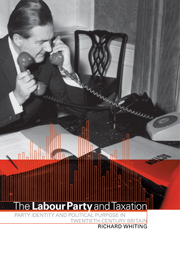Book contents
- Frontmatter
- Contents
- List of tables
- Acknowledgements
- List of abbreviations
- Introduction: Taxation and political debate
- 1 Struggles within a liberal inheritance, 1906–1940
- 2 The changing balance of tax interests, 1940–1954
- 3 The Kaldor era, 1951–1965
- 4 Social democracy examined, 1965–1970
- 5 Defensive positions, 1970–1979
- 6 Epilogue: New Labour, old problems?
- 7 Conclusion
- Select bibliography
- Index
6 - Epilogue: New Labour, old problems?
Published online by Cambridge University Press: 07 August 2009
- Frontmatter
- Contents
- List of tables
- Acknowledgements
- List of abbreviations
- Introduction: Taxation and political debate
- 1 Struggles within a liberal inheritance, 1906–1940
- 2 The changing balance of tax interests, 1940–1954
- 3 The Kaldor era, 1951–1965
- 4 Social democracy examined, 1965–1970
- 5 Defensive positions, 1970–1979
- 6 Epilogue: New Labour, old problems?
- 7 Conclusion
- Select bibliography
- Index
Summary
‘No issue is more sensitive for Labour than tax.’ This might have been the guiding theme of Labour's modernizers as they took the party from defeat in 1992 to the greatest victory of its history in 1997. Certainly the chroniclers of that election noted how successfully Labour had become the party that the electorate decided to trust on tax: ‘The main achievement was to turn around the two key deficits of 1992 on leadership and tax.’ But this triumph did not go unchallenged either inside or outside the party. To some commentators, Labour's pre-election commitment not to increase taxes could not be squared with its commitment to better public services and seemed to be a betrayal of its fundamental party identity: ‘Britain can have more and better public services and higher taxes, which is what Labour should stand for. Britain can have fewer or less lavish public services and lower taxes, which is what the Tories should stand for. The country cannot have it both ways.’ Within the Labour Party some thought higher taxes were the appropriate response to the tax changes of the Conservative governments as well as the way to fund higher public spending. For much of its history Labour had been dogged by a reputation as the taxing party. In 1997 it seemed to have buried that and reaped a glorious reward. But has Labour found a solution or avoided one?
- Type
- Chapter
- Information
- The Labour Party and TaxationParty Identity and Political Purpose in Twentieth-Century Britain, pp. 259 - 268Publisher: Cambridge University PressPrint publication year: 2001



